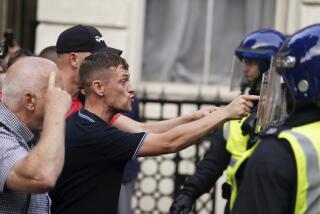Athens court firebombed as nationwide unrest continues
- Share via
ATHENS AND MADRID — Hooded youths attacked the Athens courthouse with firebombs Wednesday and a general strike by labor unions shut down most of the country as nationwide urban unrest entered its fifth night.
The worst riots in years, sparked by the fatal shooting by police of a 15-year-old boy Saturday, have left Greece’s fragile center-right government fighting for survival. The strike by about 100,000 workers shut down most transportation as well as banks and hospitals.
The crisis has worsened with authorities’ inability to stop rampages by gangs who have burned, vandalized and looted hotels, banks and stores in the historic center of the capital and in cities around the country.
Leaders of the center-left opposition Wednesday repeated their demand for early elections. They said the street violence shows that Greeks are fed up with economic woes and corruption scandals under the administration of Prime Minister Costas Karamanlis.
“This country is not being governed,” Evangelos Venizelos, a Socialist Party leader, said in a speech in Parliament. “The government can no longer convince anyone.”
In a statement, Karamanlis condemned the violence.
“The rioters, with their acts, once again demonstrated that the only thing that inspires them is the destruction,” he said. “They have targeted social peace, the rule of law and democracy itself.”
The shooting Saturday night was one of the recurring clashes between police and youths, mainly anarchists and extreme leftists, in a country that otherwise has a low rate of violence. The setting was the Exarchia area of Athens, a gentrifying neighborhood dominated by students and activists near the Polytechnic University.
A group of youths threw objects at a police car, then confronted two officers who got out, according to officials. A gunshot during the clash killed Alexandros Grigoropolous, a private school student and son of middle-class professionals.
One officer has been charged with murder and the other as an accessory to murder.
But a hearing at the heavily guarded courthouse Wednesday appeared to support assertions by the defense that the first officer had fired only a warning shot. Forensic tests have determined that the teenager was hit by a bullet that ricocheted off a wall, rather than one fired directly at the youths, according to public statements by a defense lawyer and government officials.
The officers were jailed pending trial.
A 17-year-old boy interviewed Wednesday said he participated in peaceful protests by students against what they see as a brutal and inept police force.
“I would have to say that a cop is not allowed to fire in any case and especially [not] at an innocent boy that had nothing to do with anything,” said Nikolas Daskalakis, who plans to study marketing at a university next year. At the same time, he criticized the looters.
“For the past four days and nights, it’s like the anarchists have taken over Greece,” Daskalakis said.
The general strike held Wednesday had been scheduled before the riots. Union leaders insisted on going forward despite requests from government leaders worried that it would worsen the disorder.
The crisis has revealed disgust among Greeks with a stagnant political system and one of the weakest economies in Western Europe. In a column in the Kathimerini newspaper Wednesday, commentator Alexis Papachelas described a nation adrift.
“It is difficult to discern any logic in such a situation,” Papachelas wrote. “This is a country with a state that is a shambles, a police force in disarray, mediocre universities that serve as hotbeds for rage instead of knowledge and a shattered healthcare system.”
Some analysts say the riots are less about poverty or oppression than traditions of extreme-left political activism and hostility toward police that date back three decades to the dictatorship that ruled from 1967 to 1974. As a result, Greek police lack the respect, professionalism and political support that law enforcement enjoys in many Western nations, according to John Sitilides, chairman of the Southeast Europe Project at the Woodrow Wilson International Center in Washington.
“Official restraints on forceful police actions are exploited by violent anarchists to continue rioting with impunity,” Sitilides said in an interview. “Many university students are inculcated with an anti-Western, anti-capitalist mind-set that views police as unworthy of respect, and where politicians are wary of the slightest comparisons to the hated dictatorship that brutalized many young Greeks.”
--
More to Read
Sign up for Essential California
The most important California stories and recommendations in your inbox every morning.
You may occasionally receive promotional content from the Los Angeles Times.










